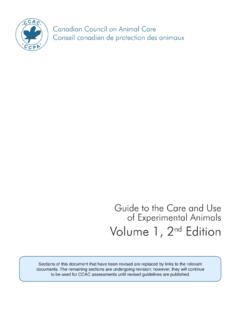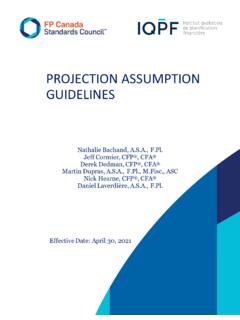Transcription of ETHICAL PRINCIPLES FOR JUDGES - Canadian Judicial Council
1 Canadianjudicialcouncilcanadianjudicialc ouncilfor judgesprinciplesethicalfor judgesprinciplesethical Canadian Judicial CouncilCatalogue Number JU11-4/2004E-PDFISBN 0-662-38118-1 Available from: Canadian Judicial CouncilOttawa, OntarioK1A 0W8(613) 998-5182(613) 998-8889 (facsimile)and at: ability of Canada s legal system to function effectively and todeliver the kind of justice that Canadians need and deserve dependsin large part on the ETHICAL standards of our Canadian Judicial Council has a central concern in this adoption of a widely accepted ETHICAL frame of reference helpsthe Council fulfill its responsibilities and ensures that JUDGES and thepublic alike are aware of the PRINCIPLES by which JUDGES should beguided in their personal and professional its creation in 1971.
2 The Council has supported the judiciary in a positive way with tools that will help to improve the delivery ofjustice in this publication in 1998 of ETHICAL Principlesfor JUDGES constitutes a valuable achievement in this owe a continuing debt of gratitude to the working committeethat the Council established in 1994 and to the many experts whocollaborated to give Canadian JUDGES an essential tool for the deliveryof justice in this Canadian Judicial Council is pleased to renew its endorsement of the high standards of conduct that areexpressed in these Right Honourable Beverley McLachlinChief Justice of and PRINCIPLES ..3 Commentary ..42 Judicial and PRINCIPLES .
3 7 Commentary .. and PRINCIPLES .. and PRINCIPLES .. and PRINCIPLES .. and PRINCIPLES ..27 CommentaryA. General ..30 BJudicial Demeanour .. and Charitable Activity ..39E. Conflicts of Interest ..44121. PurposeStatementThe purpose of this document is to provide ethicalguidance for federally appointed Statements, PRINCIPLES and Commentaries describe the very high standards toward which all JUDGES areprinciples of reason to be applied in light of all of the relevantcircumstances and consistently with the requirements of judicialindependence and the law. Setting out the very best in theseStatements, PRINCIPLES and Commentaries does not precludereasonable disagreements about their application or imply thatdepartures from them warrant Statements.
4 PRINCIPLES and Commentaries are advisory in goals are to assist JUDGES with the difficult ETHICAL and professional issues which confront them and to assist members of the public to better understand the Judicial are not and shall not be used as a code or a list ofprohibited do not set out standards definingjudicial independent judiciary is the right of every judge must be and be seen to be free to decide honestly andimpartially on the basis of the law and the evidence, withoutexternal pressure or influence and without fear of interferencefrom anyone. Nothing in these Statements, PRINCIPLES andCommentaries can, or is intended to limit or restrict judicialindependence in any do so would be to deny the very thing this document seeks to further: the rights ofeveryone to equal and impartial justice administered by fair and independent JUDGES .
5 As indicated in the chapter on JudicialIndependence, JUDGES have the duty to uphold and defendjudicial independence, not as a privilege of Judicial office but as the constitutionally guaranteed right of everyone to have their disputes heard and decided by impartial Statements, PRINCIPLES and Commentaries are the latest in a series of Canadian efforts to provide guidance to JUDGES on ETHICAL and professional questions and to better informthe public about the high ideals which JUDGES embrace andtoward which they build upon the earlier work of the Hon. in A Book for Judgespublished in 1980, the Rt. Hon. Gerald Fauteux in Le livre du magistratalso published in 1980, the Canadian Judicial Council s Commentaries on JudicialConduct published in 1991 and Professor Beverley Smith s text,Professional Conduct for Lawyers and JUDGES (1998).
6 While drawingheavily on these invaluable resources, the present publication is by far the most comprehensive treatment of the subject to date in Canada. But it cannot provide exhaustive coverage of themyriad issues that arise in sources just mentioned,as well as those referred to in the next Commentary, willcontinue to be of assistance to Canadian the references throughout the text indicate, a wide varietyof sources have been consulted in the process of preparing include not only Canadian sources but also the Code of Judicial Conduct applying to the United StatesFederal judiciary, the American Bar Association s Model Code of Judicial Conduct(1990) as well as scholarly writing and rulingsconcerning Judicial conduct in Canada, the United Kingdom,Australia and the United States.
7 Of particular note are , Judicial Ethics in Australia(2d, 1997), J. Shaman et al, Judicial Conductand Ethics(2d, 1995) and S. Shetreet, JUDGES on Trial(1976). Whileall of these sources are helpful, this document is uniquely thework of Canadian process which resulted in theseStatements, PRINCIPLES and Commentaries was carried forward by a Working Committee representative of both the CanadianJudicial Council and the Canadian JUDGES Conference. Anextensive process of consultation within the judiciary and beyondensured that these Statements, PRINCIPLES and Commentaries havebeen the subject of painstaking examination and vigorous intention is that Canadian JUDGES will accept these Statements, PRINCIPLES and Commentaries as reflective of their high ethicalaspirations and that they will find them worthy of respect anddeserving of careful consideration when facing any of the issuesaddressed in document of this nature can never be viewed as the finalword on such an important and complex subject.
8 Publication of these Statements, PRINCIPLES and Commentaries coincides withthe establishment of an Advisory Committee of JUDGES to whichspecific questions may be submitted by JUDGES and which willrespond with advisory process will contribute to ongoing review and elaboration of the subjects dealt with inthe PRINCIPLES as well as introduce new issues that they do notaddress. More importantly, the Advisory Committee will ensurethat help is readily available to JUDGES looking for JudicialIndependenceStatement:An independent judiciary is indispensable to impartial justice under law. JUDGES should,therefore, uphold and exemplify judicialindependence in both its individual andinstitutional must exercise their Judicial functions independently and free of extraneous must firmly reject any attempt to influence theirdecisions in any matter before the Court outside the properprocess of the should encourage and uphold arrangements andsafeguards to maintain and enhance the institutional andoperational independence of the should exhibit and promote high standards of Judicial conduct so as to reinforce public confidence which is the cornerstone of Judicial independence is not the private right of JUDGES but thefoundation of Judicial impartiality and a
9 Constitutional right of allCanadians. Independence of the judiciary refers to the necessaryindividual and collective or institutional independence requiredfor impartial decisions and decision independencethus characterizes both a state of mind and a set of institutionaland operational former is concerned with thejudge s impartiality in fact; the latter with defining the relationshipsbetween the judiciary and others, particularly the other branchesof government, so as to assure both the reality and the appearanceof independence and Statement and Principlesdeal with JUDGES ETHICAL obligations as regards their individual andcollective do not deal with the many legalissues relating to Judicial Valente Queen,LeDain, J.
10 Noted that ..judicialindependence involves both individual and institutionalrelationships: the individual independence of a judge, as reflected in such matters as security of tenure and the institutionalindependence of the court or tribunal over which he or she presides, as reflected in its institutional or administrativerelationships to the executive and legislative branches ofgovernment. 2He concluded that .. Judicial independence is a status or relationship resting on objective conditions orguarantees as well as a state of mind or attitude in the actualexercise of Judicial 3 The objective conditions andguarantees include, for example, security of tenure, security ofremuneration and immunity from civil liability for Judicial , JUDGES on Trial,(1976) (hereafter Shetreet ) at [1985] 2 673 at first qualification of a judge is the ability to makeindependent and impartial subject of judicialimpartiality is treated in detail in chapter 6.






